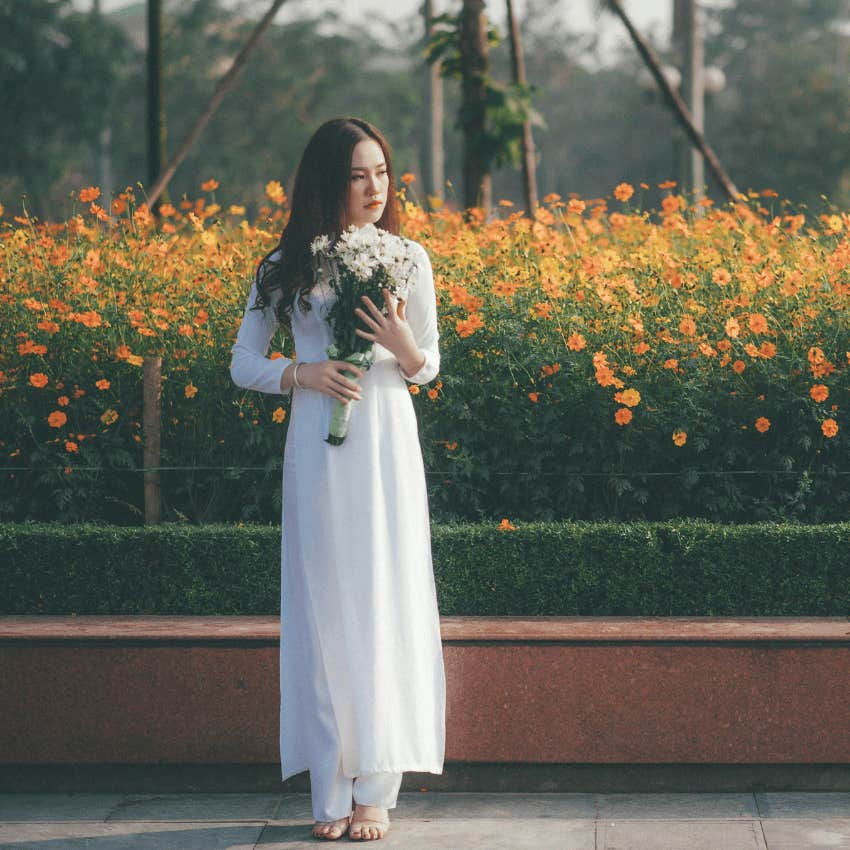Being 'Purposefully Single' Is Getting Political — But Is It Warranted?
A cry of freedom for some, a scream of loneliness for others.
 LOOK | Canva
LOOK | Canva As a person who does feminist writing regularly, I watch and listen to a lot of podcasts and shows on YouTube. Many of these shows involve dating tips, dating disasters, and more. I love a good deep dive into bad dating disasters. They make me feel better about my own mental, cringeworthy past, and they also make me think about human nature.
For the most part, it’s always been the same stuff: people telling you not to accept less, people telling viewers to dump abusive people, and people offering deep-dive advice on how to “rizz” up a person. That’s how it used to be. Recently, things started to change.
Over the past year or so, I started to notice something that was once only relegated to the manosphere. Singledom has become a political issue for both men and women. I think we need to take a closer look at this trend because it’s becoming apparent to me that singledom has become a political issue. If you look at the history, it’s clear that there are motives no one is talking about.
The first people to politicize being 'purposefully single' or refusing to marry were members of the manosphere.
As someone who worked in the Pickup community back then, I was one of the first to notice the uptick in articles about men not being willing to marry women.
Men pointed out that they felt they weren’t getting a good deal from marriage. After seeing how badly divorce treated their friends, many men felt like it made no sense to marry. This was also compounded by the fact that women are usually the first ones to initiate divorce.
Most of the men who I heard espouse this view had a certain bitterness in them, often directed toward women who began to turn their attention to careers. It often boiled over into “Women want to be Miss Independent, so I’mma just let ‘em.”
While few admitted it was a matter of political protest, it’s hard to ignore how many men mentioned the problem of courts being “stacked against them."
Over time, the complaints became angrier and angrier. The complaints stopped being about divorce court and started being about women’s standards. It started becoming more about taking out their frustration on women who they perceive as rejecting them.
 Tran Duc Hung | Pexels
Tran Duc Hung | Pexels
This was also the time when talks about the incel movement started to kick off.
Incels became a major talking point on sites like 4Chan, though the original incel was a woman. Originally, the term “incel” was about people who just weren’t getting lucky or couldn’t find an adequate partner.
It was a term invented by a woman in 1997 when things were a lot simpler. It was the idea of “I would like sex and romance, but I’m just not finding what I want. I don’t hate the opposite sex. I’m just disappointed.”
When 4Chan got its teeth into it, things changed. It became angrier, more entitled, and far more hateful. It became a movement of mostly men, all of whom believed they were owed a woman regardless of whether she liked him or not.
The incels of today do not see women as people. They see them as objects, holes, and birthing vessels — completely devoid of feelings. And they want to hurt them. It’s become such a huge part of incel ideology, websites won’t host incel forums out of fear that they will have their servers seized during a raid.
To date, incels have caused the deaths of hundreds of people. The FBI now views incels as a threat to national security. Incels are no longer just lonely people who can’t find “the one;” they’re officially seen as domestic terrorists.
According to research, incels experience considerable duress on account of their singlehood, report that their (low) self-esteem is contingent on their relationship status, and are both sensitive to rejection and experience a significant degree of it.
Researchers found that they cope with this rejection by engaging in inward and outward practices, reporting higher levels of self-critical rumination and externalization of blame while also engaging in fewer healthy coping mechanisms.
From about 2015 to 2020, most of the noise about the dropoff in marriage came from men.
There were so many articles talking about how women need to lower their standards if they want to get a man — and it was made clear that almost any man would do.
It was about that time that I felt a growing feeling in the pit of my stomach. At the time, I was either single or dealing with awful men who kept giving me shut-up rings. I was seeing my female friends running in the same circles, all of us feeling cheated out of a ring and official recognition.
Shortly before I met my husband, I had considered whether it was even worth pursuing men. Even to this day, I still feel like men never gave me as much as I invested in them. It’s a sentiment that I often hear whispered by women in my circles.
Something in me broke, and I decided to research whether women were dropping out of the dating scene. I was one of the first people to point out that women are quitting the dating scene in spades. My first article on the topic was three years ago — an article I wrote on my off-work account at Vocal.
Since that first article, the discussion about single women by choice exploded.
I wrote about women dropping out of the dating scene a little later on. It struck a powerful nerve. To date, 49,000 people have seen it and 28,000 people have read it.
It opened up the floodgates, and people quickly started to jump on the bandwagon to talk about it. Today, it’s become a major talking point, especially among female dating advisors.
The simple gist of it? Men are the juice that’s often not worth the squeeze. People are talking about the trauma of negging, abuse, financial duress, and even things like reproductive coercion as a way to control women.
Much of the silence around the topic was due to the still-there-stigma of being a single woman. When that stigma started to fade, it became a political movement — a feminist way of saying that it’s okay to be happily single.
It reached a fever pitch with South Korea’s #4B movement and the overturn of Roe v. Wade.
Lately, America and other Western countries have seen a major rollback in women’s rights as well as a huge uptick in misogyny. After the death of Roe v. Wade, many women rightfully stopped dating. This was a movement that hit conservative men particularly hard.
Meanwhile, across the pond in South Korea, another similar movement was brewing: 4B. This movement started up as a revolt against the increasingly violent, vitriolic behavior of Korean men against women.
At this point, singledom wasn’t just a personal choice for people to consider. It became a way to show your politics — a way to raise your middle finger to the patriarchy that turned women into commodities expected to be distributed like rice or wheat.
Surveys reported that 76% of men in their 20s oppose feminism, in contrast to 64% of women in their 20s who support feminism. Unsurprisingly, almost 60% of respondents in their 20s believed gender issues are the most serious source of conflict in South Korea.
The politicization of being single also has a secondary effect on how we perceive people’s mental health.
Bad as it is to say, I know a lot of women who won’t date a guy who’s been single for more than a couple of years. They assume that he’s either misogynistic (like Red Pill men) or unhinged (like incels). Men see women who are career-oriented, dealing with dating burnout, or who are single by choice as “high-standard, gold-digging queens” with a dash of misery.
In reality, many (if not most) people who are single by choice are healthy and mentally well individuals. They just aren’t prioritizing a relationship because they feel the juice isn’t worth the squeeze. It’s the vocal minority who make a point of turning it political — or even hateful, in the case of misogynists — that give most singles a bad look.
The truth is that singledom shouldn’t have to be a political statement, but our society made it one.
I know way too many people who are single for personal choices (or just burnout and bad luck) who struggle with the assumptions people make about them. Choosing not to date after one bad date too many should be okay.
We should have a society that doesn’t stigmatize singledom. It also shouldn’t come with quiet assumptions about a person’s political leanings, mental health, or social life either.
And yet, it’s become a major issue. What’s ironic, though, is that the right to be single without judgment is a feminist issue. That fact alone often means the very men who need that dose of feminism are the same ones railing against feminism as a whole.
All of this is so unnatural. We shouldn’t have to feel the need to pair up to show that we’re adequate to society. We also shouldn’t have to browbeat people into relationships who aren’t beaten for it. This should be as nonpolitical as whether you eat Cinnamon Toast Crunch or Kix for breakfast.
No matter where you look, the focus on being single to make a statement and/or demanding a partner at all costs is affecting people’s mental health, and it should never have gotten this bad.
There’s a lot of irony in the unhealthy, political attitudes people took toward dating. Being coupled up is a goal of most people, but it shouldn’t be a requirement. Moreover, it’s not even healthy to be in a toxic relationship just so you can say you’re coupled up.
A lot of social problems would end if we stopped making the act of existing as a single person a political, stigmatized, and triggering topic.
Instead of making singledom an identity wrapped in human rights, can we just make it a random individual trait again? That’d be nice.
Ossiana Tepfenhart is a writer whose work has been featured in Yahoo, BRIDES, Your Daily Dish, Newtheory Magazine, and others.

